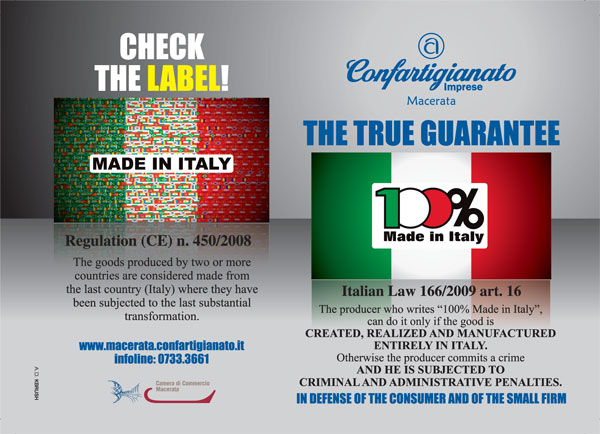Regulations
In defense of the consumer and the small firms
The 100% Made in Italy logo
The 100% Made in Italy logo guarantees the product origin, quality of materials, care over production and consumer protection. Anyone displaying the logo without complying with the restriction whereby all stages (conception, design and development) must be carried out entirely in Italy, will be punished by pecuniary administrative fines of between € 10,000 and € 250,000.
(Italian Law no. 166/2009 Art. 16)
1. Any product or goods that can be classified as “Made in Italy” in accordance with current legislation, and therefore for which the idea, design, production and development is carried out exclusively on Italian territory, is considered as made entirely in Italy.
2. The methods by which paragraph 1 shall be applied can be defined by one or more decrees issued by the Ministry of Economic Development, jointly with the Ministries of agricultural, food and forestry policy, for European policy and for legislative simplification.
3. For the purpose of the application of paragraph 4 for the use of the indication of sale or brand, reference is made to use for the purpose of commercial communication, or its addition to the product or sales packaging or goods at customs presentation, for release for consumption or free practice and until retail sale.
4. Anyone using an indication of sale that presents the product as entirely made in Italy, such as “100% made in Italy”, “100% Italy”, “all Italian”, in whatever language such may be stated, or any other similar such wording that leads the consumer to believe that the product has indeed been created entirely in Italy, or marks or logos that result in the same belief, where not true in accordance with the provisions of paragraphs 1 and 2, shall be punished, without prejudice to the various sanctions applicable under current legislation, with the penalties established by Article 517 of the Italian Criminal Code, increased by one third.
5. In paragraph 49 of Article 4 of Italian Law no. 350 of 24 December 2003, the words: “misleading commercial practices” are followed by: “without prejudice to the provisions of paragraph 49a”.
6. The following is added after paragraph 49 of Article 4 of Italian Law no. 350 of 24 December 2003:
“49a. Use of the trademark, by the owner or licensee, in a way such as to lead a consumer to believe that the product or goods originate from Italy, in accordance with European legislation on origin, without their being accompanied by specific, clear indications as to foreign provenance or origin, or in any case sufficient to avoid any misleading of the consumer as to the effective origin of the product, or without being accompanied by due certification, made by the owner or licensee of the trademark, on the information it provides during the marketing on the effective foreign origin of the product, shall constitute false indication. The offender is punished by means of application of a pecuniary administrative fine of between € 10,000 and € 250,000.
49 -ter . Products or goods pursuant to paragraph 49amay be subject to administrative confiscation, except where the indications set out therein are added by the owner or licensee responsible for the crime, to the product or packaging or accompanying documents for the consumer”.
7. The provisions pursuant to paragraphs 5 and 6 apply forty-five days after the coming into force of this decree.
8. Paragraph 4 of Article 17 of Italian Law no. 99 of 23 July 2009 is abrogated.
8 -bis . In order to enable greater competitiveness for Italian agricultural food products and to support Made in Italy, the following is included after paragraph 2 of Article 1 of Italian Legislative Decree no. 297 of 19 November 2004:
“2a. No sanction shall apply in accordance with paragraph 2 occur if the party involved in the control system has been authorised to apply de-branding in accordance with the regulation issued, upon approval of the Ministry of agricultural, food and forestry policy, by the Protection Consortium or, for lack of any recognition provision of the Consortium, by the Ministry of agricultural, food and forestry policy and has not, for the de-branded product, benefited from any public grants. By specific decree of the Ministry of agricultural, food and forestry policy, the terms and conditions connected with de-branding are identified.
2 -ter . Authorisation to de-brand the product must be declared by the party concerned to the control body and shall not exonerate it from the pecuniary obligations with regards to the Protection Consortium and the control structure”.

